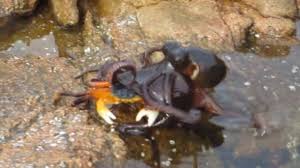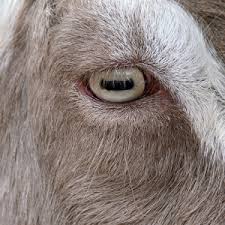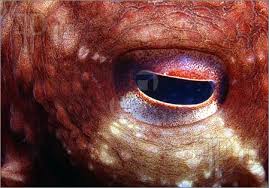Here’s Steinbeck describing a hunting octopus in Cannery Row (1945) , and the quality of the writing would convince me that he witnessed this, even if I hadn’t known that he was a keen naturalist.
“Then the creeping murderer, the octopus, steals out, slowly, softly, moving like a gray mist, pretending now to be a bit of weed, now a rock, now a lump of decaying meat while its evil goat eyes watch coldly. It oozes and flows toward a feeding crab, and as it comes close, its yellow eyes burn and its body turns rosy with the pulsing color of anticipation and rage. Then suddenly it runs lightly on the tips of its arms, as ferociously as a charging cat. It leaps savagely on the crab, there is a puff of black fluid, and the struggling mass is obscured in the sepia cloud while the octopus murders the crab.”
Steinbeck’s opening phrases and the way they’re slowed down by punctuation – “the creeping murderer” COMMA “steals out” COMMA “slowly” COMMA ” softly” COMMA – conveys, perhaps obviously but certainly effectively, the surprising tendency of an octopus to stalk its prey.
How do you describe something boneless and almost amorphous? You have to capture it second by second, and note down each form as it appears, as Steinbeck does: swaying in the current like “a bit of weed”, then still and solid as a rock, then something in between – “a lump of decaying meat” that would have both solid and loose elements underwater.
According to Steinbeck, octopuses have “goat eyes”. Let’s see…
Well, how about that? According to Ashley Cox on Science 2.0, goats and octopuses evolved rectangular pupils because they are both prey animals that need to be on the lookout day and night.
Of course, in this excerpt, the octopus is the predator and Steinbeck doesn’t hesitate to assign morality to the animal: ‘its evil goat eyes watch coldly”, then, before the attack “its yellow eyes burn … with anticipation and rage”. What it does to the crab is characterised as “murder” committed in the dark of a “sepia cloud” that the “murderer” can conjure up for his own convenience.
Of course, there’s drama in Steinbeck’s choice, because it captures the shock and violence of the moment when one being closes in to snuff the life of another. I would add that the choice also makes sense in the light of research that shows that octopuses are among the most intelligent creatures on Earth.
For me, there’s something significant about literature and scientific research describing the same things. It proves again that they’re both, ultimately, in the truth business.
Do you have any favourite descriptions of nature? Or of octopuses?



